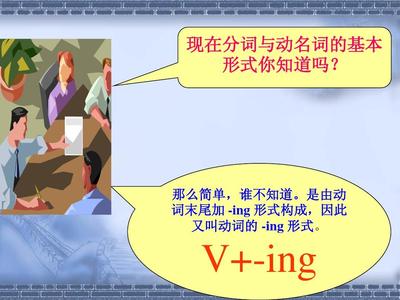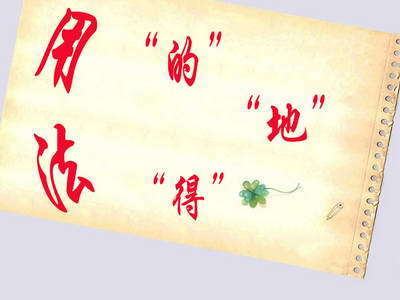【本讲教育信息】
一. 教学内容:
动词ing形式(动名词)的形式及用法
1. doing的形式:doing; being done
2. doing做主语,表语和宾语。
3. doing与to do在动词后面做宾语的区别
二. 知识总结归纳:
(一)动词ing形式起名词作用,在语法中也称做动名词.在句中做主
语,宾语,表语和定语。它的基本形式有doing; being done。
例句:
1. Parking is difficult in the shopping center of the city.
2. My favorite job is teaching English.
3. His main hobby is collecting stamps.
4. Denying this will be shutting one’s eyes to fact.

5. I suggest you should practise speaking English whenever you can.
6. Hearing what I said, he couldn’t help laughing.
7. Did you see that car being repaired ?
注:to do形式也可以做主语或表语。一般情况下,这两种形式做主
语或表语,差别不是很大。但是如果刻意强调某个具体的动作,就用to
do 形式, 而要表示一般性或泛指的动作则用doing形式。
例如:
1. It is difficult to park in the shopping center at the weekend.
2. My duty is to take care of the baby while she is out.
(二)在一些动词后面只能接动名词做宾语。后面跟doing做宾语的常
见动词有:admit; advise; appreciate; avoid; complete; consider;
deny; mention; mind; miss; prevent; delay; enjoy; escape;
imagine; postpone; practise; risk; suggest;常见的动名词短语,如:
be worth doing; can’t help doing; look forward to doing; go on
doing; insist on doing; prefer doing to doing; be busy doing; keep
on doing; devote…to doing; spend…in doing; have difficulty in
doing; have a good time doing; prevent…from doing
1. I am looking forward to hearing from you soon.
2. He has devoted himself to protecting the wildlife.
3. He is trying to avoid answering my question.
4. The accused man denied ever having met her.
5. He insisted on sending for doctor at once.
6. The film is well worth seeing.
7. You can’t imagine the difficulty we had making a little money.
(三)doing形式的逻辑主语:当强调doing所表达的动作的执行者(逻
辑主语)时,需要在doing前面加上物主代词,人称代词宾格,名词所
有格或不定代词
例句:
1. I’m surprised at your/you doing it.
2. She insisted on their both accepting the invitation.
3. Do you mind my opening the window ?
4. Your being right doesn’t necessarily mean my being wrong.
5. The children are looking forward to spring coming.
6. He disapproved of that being said about Jane.
7. Mr. Carson complained about Tom and Mary coming to class late.
(四)doing与to do在动词后面做宾语的区别:
remember/forget to do:记住/忘记了去做某事
Don’t forget to do sth.=remember to do sth.
regret to do: 遗憾地去做/说 regret doing: 后
悔做了某事
mean to do= want to do mean doing 意味着
做
stop to do: 停下来去做 stop doing 停止/不
去做
try to do: 试图/努力/企图去做 try doing: 尝试
用一种方法做
go on to do 接着去做另一件事 go on doing: 继续
把事情做下去
例句:
1. Don’t forget to mail this letter tomorrow morning.
2. I don’t remember having said anything of the sort.
3. I regret to say that you have failed in the exam.
4. He tried to walk without a crutch.
5. He went on to tell us about the accident.
【典型例题】
一. 单项选择:
1. While shopping, people sometimes can’t help ____ into buy something they don’t really need.
A. to persuade B. persuading C. being persuaded D. be persuaded
分析:题意为:进店购物,人们有时不得不被购买不想买的东西。can’t help doing 不得不,禁不住做某事。主语people与persuade为被动关系,所以应用being done。
答案:C
2. In some parts of London, missing a bus means ____ for another hour.
A. waiting B. to wait C. wait D. to be waiting
分析:根据句意:错过一班车意味着要再等上一个小时。意味着作某事:mean doing。
答案:A
3. How many of us_____, say, a meeting that is not important to us would be interested in the discussion?
A. attended B. attending C. to attend D. have attended
分析:根据句意:比如说,我们当中参加一个对我们毫不重要的会议的人会有多少人对这个讨论感兴趣呢?us_____, say, a meeting that is not important to us作为动名词短语做of的宾语。
答案:B
4. —What should I do with this passage ?
—___ the main idea of each paragraph.
A. Finding out B. Found out C. Find out D. To find out
分析:问句中should用与征求建议,答语中应当是祈使句语气提出要求。
答案:C
5. I can’t understand ___ her like that.
A. you treat B, you to treat C. why treat D. you treating
分析:understand后面接动名词做宾语.you为动名词treating的逻辑主语。
答案:D
6. He got well-prepared for the job interview, for he couldn’t risk __ the good opportunity.
A. to lose B. losing C. to be lost D. being lost
分析:risk后面跟动名词做宾语。
答案:B
二. 短文改错:
1. Shake her head, she said, “ It isn’t a good time to do that, dear.”
分析:根据句意,shake her head 为后一句的伴随状语,
答案:Shake 应改为Shaking
2. It’s like going to a huge library without have to walk around to find.
分析:without是介词,后面应接doing形式。
答案:have 应改为having
3. Having a pleasant trip and see you Friday.
分析:根据句意,本句是祈使句,
答案:Having应改为Have
4. Soon I began to enjoy talk to myself on paper……
分析:enjoy后面跟doing形式
答案:talk 应改为talking
【模拟试题】(答题时间:60分钟)
一. 单项选择:
1. Don’t you think the question _____ at the moment is of great importance.
A. being discussed B. discussed
C. to be discussed D. to discuss
2. The food _____ at the moment is for the dinner party.
A. cooked B. to be cooked
C. is being cooked D. being cooked
3 . When asked by the police, he said that he remembered ___ at the party, but not ____.
A. to arrive; leaving B. to arrive; to leave
C. arriving; leaving D. arriving; to leave
4. I really appreciate ____ to relax with you on this island.
A. to have had time B. having time
C. to have time D. to having time
5. Mr. Reed made up his mind to devote all he had to _ _ some schools for poor children.
A. set up B. setting up
C. have set up D. having set up
6. The man insist ____ a taxi for me even though I told him I lived nearby.
A. find B. to find
C. on finding D. in finding
7. There’s a man at the reception desk who seems very angry and I think he means __ trouble.
A. making B. to make
C. to have made D. having made
8. As I will be away for at least a year, I’d appreciate ____ from you now and then ___ me how everyone is getting along.
A. hearing; tell B. to hear; tell
C. hearing; telling D. to hear; to tell
二. 完型填空:
More than forty thousand readers told us what they looked for
in close friendship, what they expected 1 friends, what they
were willing to give in 2 , and how satisfied they were 3 the
quality of their friendships. The 4 give little comfort to social
critics . Friendship 5 to be a different form of 6
relationships. Unlike marriage or the ties that 7 parents and
children, it is not explained or regulated by 8 . Unlike other
social roles that we are expected to 9 –as citizens, employees,
members of professional societies and 10 organizations –it has
its own rule, which is to develop 11 of warmth, trust and love
12 two people. The 13 on friendships appeared in
Psychology Today in March. The findings 14 that topics of
trust and betrayal are 15 to friendship. They also suggest that
our readers do not 16 for friends only among those who are
17 like them, but find many 18 differ in race, religion, and
background. Arguably the most important 19 that appears in
the article, 20 , is not something that we found--but what we
did not.
1. A. onB. of C. toD. for
2. A. addition B. pay C. turnD. return
3. A. about B. of C. with D. by
4. A. resultsB. effectsC. expectationsD. ends
5. A. feelsB. leads C. soundsD. appears
6. A. humanB. mankind C. theirD. civil
7. A. joinB. relate C. control D. attract
8. A. force B. law C. rule D. order
9. A. keep B. do C. show D. play
10. A. all B. any C. other D. those
11. A. friendship B. interestsC. feelings D. relations
12. A. between B. on C. in D. for
13. A. book B. article C. description D. wish
14. A. warn B. believe C. prove D. solve
15. A. true B. main C. false D. central
16. A. ask B. call C. care D. look
17. A. most B. more C. least D. less
18. A. people B. who C. what D. friends
19. A. conclusion B. summary C. decision D. demand
20. A. moreover B. however C. still D. yet
三. 阅读理解:
We are all familiar with domestic trade. When I buy Florida oranges or California shirts, I naturally want to pay in dollars. Luckily. the orange grower and the shirt manufacturer are willing to accept U.S. dollars for their expenses. Trade can be carried on in dollars. Economic transactions within a country are relatively simple.
If I want to buy a British bicycle, however, matters become more complicated. I must ultimately pay in British money, or "British pounds,” rather than in dollars. Similarly, if the British want to buy U.S. merchandise, they must obtain U. S. dollars. And the requirement to obtain foreign currencies bolds for other countries as well.
We see, then, that international trade introduces a new element: the foreign exchange rate, which denotes the price of a foreign country's currency in terms of our own.
Here are some examples: The U. S. dollar price of a British pound was recently $ I. 80; for a British resident wanting to buy U. S. goods, the price of a dollar was ?1/$1.80= ?0.56. There is also a foreign exchange rate between U. S. dollars and the currency of each and every country, In mid—1988, the foreign exchange rate was 60 cents for a German mark, 18 cents for a French franc, 80 cents for a Canadian dollar, and 0. 8 cent for a Japanese yen. For foreigners desiring to buy dollars, the reciprocal prices were 1. 67 German marks. 5. 56 French francs, 1.25 Canadian dollars, or 125 Japanese yen for each U.S. dollar.
Given the foreign exchange rate, it is now possible for me to buy my English bicycle. Suppose its quoted price is , ?100(i.e. , 100 British pounds). All I have to do is look in the newspaper for the foreign exchange rate for pounds. If this is $1.80 per pound, I simply go to a bank with $180 and ask that the money be used to pay the English bicycle exporter. Pay with what? The bank pays with pounds, of course, the kind of money the exporter needs.
You should be able to show what British importers of American grain have to do if they want to buy, say a $ 36,000 shipment from an American exporter. Here pounds must be converted into dollars. You will see that, when the foreign exchange rate is $1.80 per pound, the grain shipment costs them ?20,000.
Businesses and tourists do not have to know anything more than this for their import or export transactions. But the true economics of foreign exchange rates cannot be grasped until we find out why the foreign exchange rate is at a given level.
1. It can be inferred that the writer is .
A. British. B. American. C. Chinese. D. French.
2. What is meant by the third paragraph?
A. The foreign exchange rate is an element coming with international trade dealing with foreign countries’ currency.
B. International trade introduces the clement of the foreign exchange rate indicating a foreign currency at our own price
C. The foreign exchange rate is a new element in international trade indicating the price of a country's currency in terms of the price of another country's currency.
D. The foreign exchange rate is an element introduced to denote the price of a foreign currency in terms of the price of another foreign currency.
3. In mid—1988, how much dollars did one have to have in order to exchange for 10,000,000 Japanese yen?
A. 8,000,000 B. 80,000 C. 800,000 D. 80,000,000
4. What do British importers have to do if they want to buy $ 36,000 worth of grain from an American exporter?
A. They have to pay British pounds directly.
B. They have to pay French francs.
C. They have to convert 36,000 U.S. dollars into 20,000 British pounds.
D. They have to convert 20,000 British pounds into 36,000 U.S. dollars.
5. The last paragraph implies that businesses and tourists
A. do not have to know the true economies of foreign exchange rates.
B. do not have to know more the true economics of foreign exchange rates.
C. have to know nothing more than economics of foreign exchange rates.
D. do not have to grasp the true economics of foreign exchange rates at a given level.
【试题答案】
一. 单项选择:
1. A the question _____ at the moment指此刻正在被讨论的问题。being done做定语指:正在被……的事。
2. D 正在被做的食物。being done做定语指:正在被……的事。
3. D 当受到警察的询问时,他说他记得到过那个晚会,但是没有离开过。remember doing:记得做过某事。remember to do:记得没有做…
4. B appreciate doing sth. 做某事不胜感激。
5. B devote….to doing:致力于做某事。Mr. Reed决定倾其所有为贫困儿童建立学校。
6. C insist on doing sth.:坚持做某事。
7. B 我想他想要惹麻烦。mean to do sth:想要做某事;mean doing:意味着做某事
8. C 我将非常高兴收到你的来信并且告诉我你的情况。appreciate doing sth.:感激做某事
二. 完型填空:
1. B of相当于“from”。
2. D in return:“作为回报”。
3. C “be satisfied with”表示“对……满意”。
4. A “result”意为“结果”。
5. D appear意为“好像”。
6. A human是一个形容词表“人类的”。
7. A “join”表示 联系连接。
8. B 从上下文可知是通过法律来制约。
9. D “plays role”表“扮演角色,起……作用”。
10. C “other”表“其它的”。
11. C “feelings”意为“感情”。
12. A 两者之间用“between”。
13. B “article”表“文章”。
14. C “prove”意为“证明”。
15. D “central”意为“中心的、主要的”
16. D “look for”意为“寻找”。
17. B “more like”意为“更像……”。
18. B “who”引导一个定语从句。
19. D “demand”意为“要求”。
20. B 从上下文可知,是一种转折关系。
三. 阅读理解:
1. B 在第一段中作者说,当他购买佛里达的橘子或加利福尼亚的衬衫,他当然想用美金支付。这说明作者是个美国人。
2. C 第三段的意思是:国际贸易引入丁“外汇兑换率”这一概念,它指的是用一个国家自己的货币价格表示一种外国货币的价格,只有C表达了这层意思。
3. B 第四段告诉我们,在1988年,美金与日元的兑换率是0.08:l。所以,一千万日元可兑换八万美金。
4. D 第六段告诉我们,如果英国进口商要从美国进口一批价值36,000美金的粮食,需要20,000英镑。第二句句子说,英镑必须兑换成美金。因此,只有D是正确答案。
5. A 最后一段第一个句子中的this指以上几段关于外汇兑换的内容。第二个句子的意思是:然而,不了解外汇:兑换的定位标准,是无法掌握外汇兑换率经济学的真谛的。与上一句连起来理解,就是说,生意人和旅游者只要懂得上面提到的关于外汇兑换的知识就足够了,不用去懂得外汇兑换率经济学。
 爱华网
爱华网



